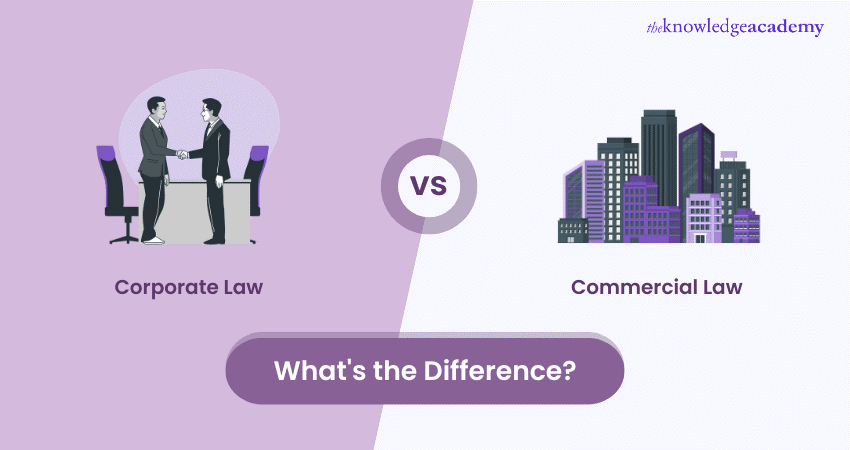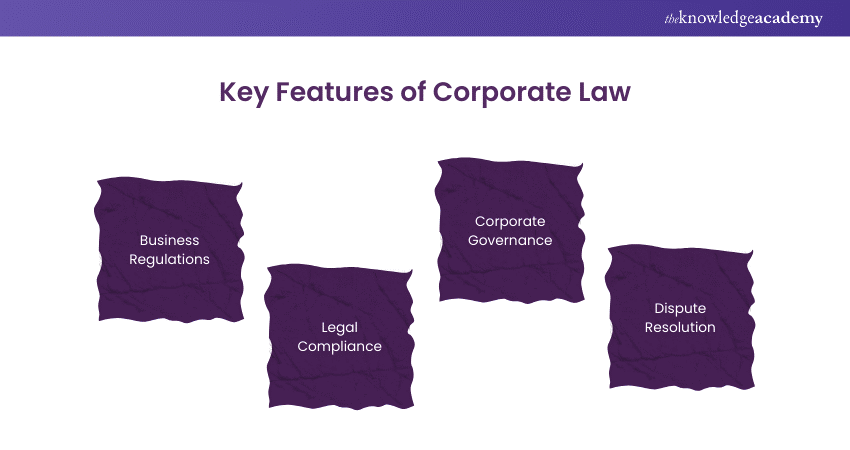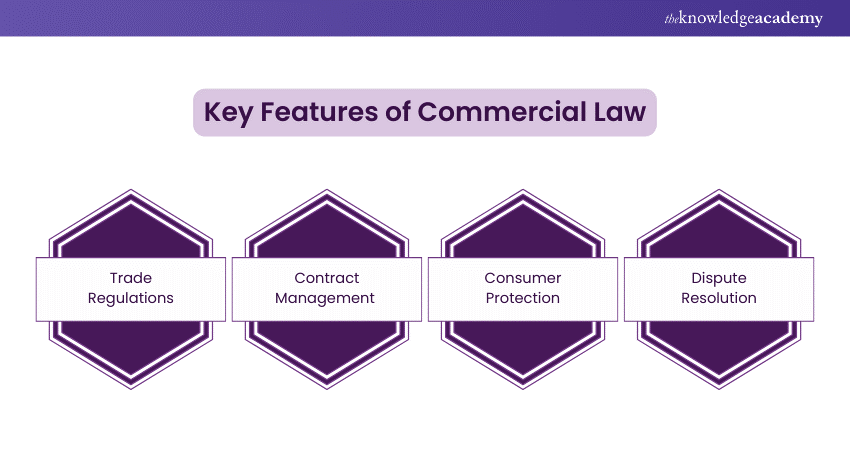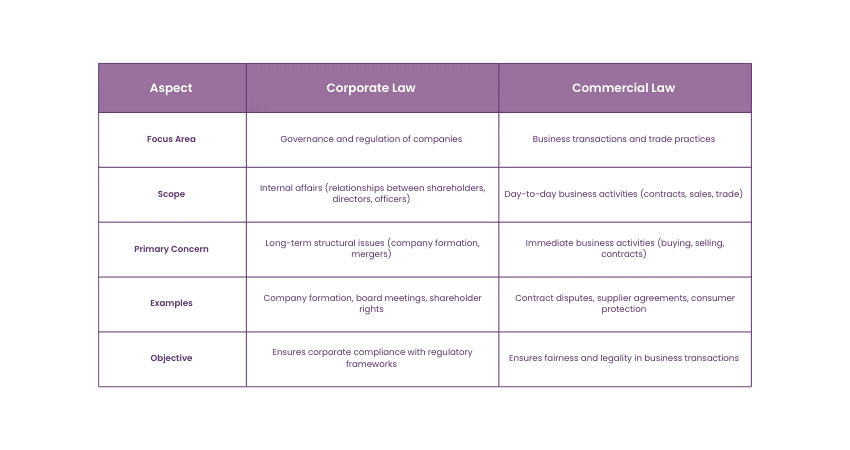We may not have the course you’re looking for. If you enquire or give us a call on + 1-866 272 8822 and speak to our training experts, we may still be able to help with your training requirements.
Training Outcomes Within Your Budget!
We ensure quality, budget-alignment, and timely delivery by our expert instructors.

Imagine running a company without knowing which legal framework protects your interests. It’s like navigating a ship without a map. Understanding the Difference Between Corporate and Commercial Law is crucial for steering your business in the right direction. These two branches of law may seem similar, but they guide very different aspects of a company's journey.
While Corporate Law focuses on the inner workings of a company—its structure, governance, and shareholder rights—Commercial Law is all about the transactions, contracts, and trade practices that keep the business running. In this blog, we’ll dive deep into the key Difference Between Corporate and Commercial Law, breaking down their distinct roles in shaping the future of your business.
Table of Contents
1) What is Corporate Law?
2) What is Commercial Law?
3) Key Differences Between Corporate and Commercial Law
4) Are Corporate Law and Commercial Law the Same?
5) Conclusion
What is Corporate Law?

Corporate Law governs the formation, management, and dissolution of companies. It focuses on ensuring that corporations operate within the legal framework set by governments and regulatory bodies. This branch of law addresses issues such as mergers, acquisitions, shareholder rights, and fiduciary duties. Essentially, Corporate Law defines how businesses are structured, how they function, and how they should behave legally.
History of Corporate Law
The roots of Corporate Law go as far back as ancient Rome. In the early days, people might have been considered separate from one another. During the Industrial Revolution, modem Corporate Law truly began to gain its own life, most of the significant developments taking place within the 19th century.
During this time, businesses started evolving into more complex organisations, and laws were needed to regulate their activities. The most influential event in corporate law is the UK's Joint Stock Companies Act 1844, which established companies as legal persons distinct from their owners—a feature that gave rise to the concept of limited liability.
Example of a Corporate Law Scenario
Imagine a scenario where a company’s board of directors plans to merge with another company. These mergers under Corporate Law must be conducted in line with the legal procedures provided. It protects the interests of shareholders and labour through these laws.
Transparency is enforced when making public records of financial records; apart from this, the merger should also comply with the articles of association for both companies. If disputes arise between shareholders about the merger, Corporate Law provides a legal avenue for resolution.
What is Commercial Law?

Commercial Law, or Business Law, involves commercial and trade practices. It encompasses different matters that pertain to the buying or selling of goods. This includes preparation of contracts, settlement of disputes, and establishment of business. Other aspects include intellectual property, consumer protection, and electronic commerce. Essentially, Commercial Law is the framework by which most commercial activities are driven.
History of Commercial Law
The history of Commercial Law goes back to ancient times; some of the earliest forms appear within the customs used by ancient traders to regulate trade. A "Law Merchant," called Lex Mercatoria, is a set of customs that emerged in medieval Europe that merchants used to regulate their cross-border trade.
Over time, these customs became codified and gradually evolved into Commercial Law. Commercial Law significantly developed in the 18th and 19th centuries in the UK due to the massive globalisation of trade established with modern principles regarding contracts, trade, and commerce.
Example of a Commercial Law Scenario
Consider a company that enters into a contract with a supplier for raw materials. The supplier, for whatever reason, cannot deliver the said materials to the manufacturing company, with resultant loss. Commercial Law would apply as legal recourse in the event of a dispute over this contract. The company can bring an action for breach of contract against the supplier and seek compensation for its losses.
Protect your business and employees with our comprehensive Employment Law Training – enhance your expertise now!
Key Differences Between Corporate and Commercial Law
Corporate and Commercial Law are two vital areas of legal practice, both essential for businesses but with distinct functions. Corporate Law focuses on the internal structure and governance of companies, dealing with matters such as formation, shareholder rights, and mergers.
On the other hand, Commercial Law governs business transactions, ensuring that trade, contracts, and commerce are conducted fairly and legally. While these areas often overlap, understanding their differences is crucial for navigating the complexities of business law effectively.

1) Focus Area
Corporate Law deals with the governance and regulation of companies, focusing on internal aspects such as relationships between shareholders, directors, and officers.
Commercial Law, on the other hand, focuses on business transactions, ensuring that trade and commerce are carried out fairly and legally.
2) Scope
Corporate Law addresses structural issues within a company, including formation, governance, and management, and mergers and acquisitions.
Commercial Law governs day-to-day business activities such as contracts, sales, trade practices, and disputes.
3) Primary Concern
Corporate Law is concerned with the long-term establishment and functioning of businesses, including their creation and dissolution.
Commercial Law Is concerned with the immediate legalities surrounding buying, selling, and other trade transactions.
4) Examples
Corporate Law deals with company formation, board meetings, and shareholder rights.
Commercial Law deals with contract disputes, supplier agreements, and consumer protection.
5) Objective
Corporate Law aims to ensure corporate compliance with regulatory frameworks, focusing on internal governance.
Commercial Law ensures fairness and legality in business transactions and commercial operations.
Are Corporate Law and Commercial Law the Same?
Although they are closely related and often overlap, Corporate Law and Commercial Law are not the same. Corporate Law, a subsidiary of business law, mainly caters to the incorporation, management, and winding up of the companies. Commercial Law is more of an overall term that comprises all legal issues covered under trade, commerce, and transactions.
For instance, a Corporate Law Lawyer may assist in drafting articles of association, guide mergers or acquisitions, or even deal with shareholder disputes, while a Commercial Lawyer would most probably draft and negotiate contracts, ensure compliance with trade regulations or deal with disputes arising from business transactions.
Stay compliant and excel with UAE Labour Law Training – empower your knowledge today!
Conclusion
Corporate and Commercial Law are vital pillars of the business world, but they serve different purposes. Corporate Law focuses on how companies are structured and managed, while Commercial Law governs the transactions and practices that drive the business world. Understanding the Difference Between Corporate and Commercial Law can be invaluable for business owners, entrepreneurs, and legal professionals alike.
Safeguard your business integrity with our Anti-Bribery Course – start protecting today!
Frequently Asked Questions

Commercial and Corporate Law offer dynamic and diverse legal challenges. From negotiating contracts to overseeing complex mergers, these fields blend strategy, negotiation, and problem-solving. They provide an opportunity to shape business landscapes, work with a variety of industries, and navigate evolving global markets.

Working in Commercial Law offers diverse experiences, such as drafting contracts, handling disputes, and advising businesses. It’s intellectually stimulating and provides insight into various industries.

The Knowledge Academy takes global learning to new heights, offering over 30,000 online courses across 490+ locations in 220 countries. This expansive reach ensures accessibility and convenience for learners worldwide.
Alongside our diverse Online Course Catalogue, encompassing 19 major categories, we go the extra mile by providing a plethora of free educational Online Resources like News updates, Blogs, videos, webinars, and interview questions. Tailoring learning experiences further, professionals can maximise value with customisable Course Bundles of TKA.

The Knowledge Academy’s Knowledge Pass, a prepaid voucher, adds another layer of flexibility, allowing course bookings over a 12-month period. Join us on a journey where education knows no bounds.

The Knowledge Academy offers various Employment Law Courses, including Commercial Law Training, Employment Law Training and UAE Labour Law Training. These courses cater to different skill levels, providing comprehensive insights into What is Employee Engagement.
Our Human Resources Blogs cover a range of topics related to Employment Laws, offering valuable resources, best practices, and industry insights. Whether you are a beginner or looking to advance your knowledge of Employment Laws, The Knowledge Academy's diverse courses and informative blogs have got you covered.
Upcoming HR Resources – Learn about Human Resources Batches & Dates
Date
 Commercial Law Training Course
Commercial Law Training Course
Fri 6th Dec 2024
Fri 17th Jan 2025
Fri 21st Feb 2025
Fri 4th Apr 2025
Fri 6th Jun 2025
Fri 25th Jul 2025
Fri 7th Nov 2025
Fri 26th Dec 2025







 Top Rated Course
Top Rated Course



 If you wish to make any changes to your course, please
If you wish to make any changes to your course, please


